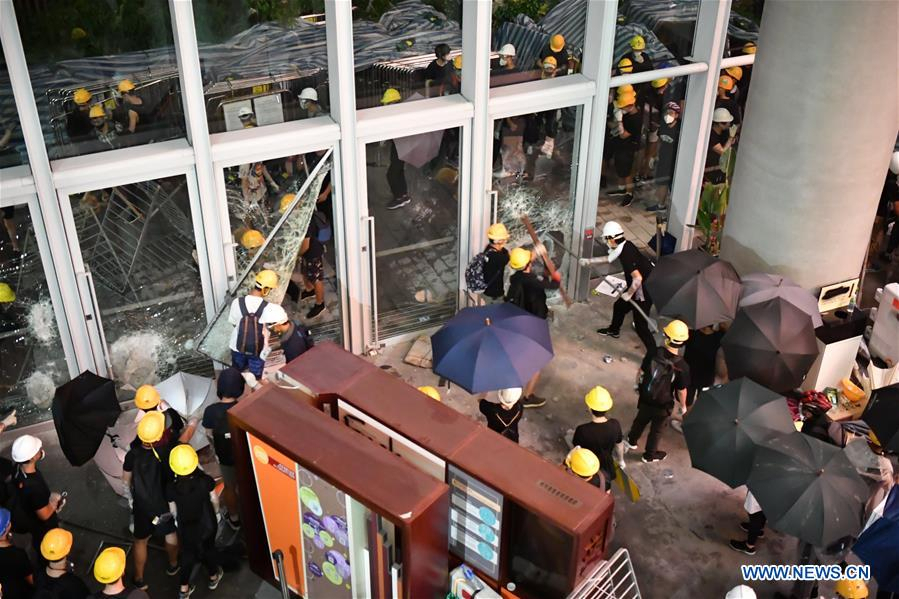
Tourists visit Victoria Harbour in the Tsim Sha Tsui district of China's HKSAR, August 20, 2019. /VCG Photo
Tourists visit Victoria Harbour in the Tsim Sha Tsui district of China's HKSAR, August 20, 2019. /VCG Photo
Editor's Note: Tom Fowdy is a British political and international relations analyst and a graduate of Durham and Oxford universities. He writes on topics pertaining to China, the DPRK, Britain and the United States. The article reflects the author's opinions and not necessarily the views of CGTN.
Veteran and award-winning British journalist Tim Sebastian recently interviewed U.S.-Hong Kong student union leader Joey Siu on Deutsche Welle. Siu, a student of City University of Hong Kong, has been one of the stronger supporters of the movement within the city. During the interview, Sebastian confronted her on the subject of protester violence in the region, which she not only refused to condemn but also attempted to justify as mere "self-defense" against the police and authorities.
The journalist quickly proceeded to take apart her claims, specifying how the growing violence was, in fact, disproportionate to circumstances and increasingly of a hate-driven nature. Still, she could not bring herself to disavow it as a tactic within the movement despite his warnings that it was "costing them international support" – in late October, the British government called for an "end the violence."
This is real journalism. It's what is needed. A skilled and impartial veteran quickly confronted and dismantled the behavior of demonstrators in Hong Kong, offering the scrutiny, critique and angle that mainstream media, whose coverage has largely been ideological and sensationalist, have simply refused to offer. This should make it quite clear that the violence in the city is not being conducted within any kind of justifiable means but is, as he stated in the interview, "out of control" and without any kind of merit.

Violent radicals break into the legislative council building, HKSAR, China, July 1, 2019. /Xinhua Photo
Violent radicals break into the legislative council building, HKSAR, China, July 1, 2019. /Xinhua Photo
First of all, what did Siu claim? She stated that the violence in the city was a form of self-defense against the police. "The government forces us to," she said, insisting that the movement was not "out of control."
This is a commonly held narrative, activist Joshua Wong Chi-fung, the leader of a political group advocating Hong Kong's independence, has said something similar numerous times.
But it doesn't really make any sense when it is held up against the facts. As Sebastian quickly pointed out in the interview, the wholesale destruction of private property – including the usage of petrol bombs, starting fires, the stabbing of a policeman, and what he went on to describe as harassment and attacks on policemen's families – should not be measured as self-defense.
This paints a very different picture from her quoted insistence that the violence is not "based on an intention to attack anybody." If we dive deeper into events in the city, we will see that protesters are increasingly and sporadically attacking mainlanders, destroying local shops and businesses owned by the Fujian community, and assaulting anyone who questions them or appears suspicious – anyone for that matter who disagrees with them.
This was raised in the interview. Sebastian described their mindset as increasingly akin to totalitarian, saying that the Hong Kong movement effectively deprived people of any right to question and critique their tactics accordingly.
Confronted with evidence against her original claims, Sui was still not able to bring herself to condemn the violence in the territory. As a result, Sebastian noted that it would be costly to the movement's international support and credibility. He told her that the movement should stop this extreme behavior and instead start seeking dialogue with the authorities, as their behavior was achieving nothing.
As a whole, this interview reveals to us a clear truth: The narrative espoused by the protesters and their backers that everything is somehow the fault of the police is no longer standing up to scrutiny. The violence in Hong Kong is as quoted, "increasingly out of control." It is not bound by reason, rationale or any kind of justifiable merit but an irrational, hysterical and blind hatred.
For Siu, the interview will likely have been a shock to the system, with activists having long taken mainstream and Western media backing for granted, happy to give a selective pass to their behavior. However, when the facts are put on the table and scrutinized accordingly, their narrative crumbles. If you haven't taken the time yet to watch the interview, please do so.
(If you want to contribute and have specific expertise, please contact us at opinions@cgtn.com)